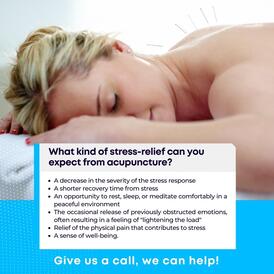 Your immune system is the most important part of your body when it comes to staying healthy and fighting off disease and illness. It works by detecting harmful pathogens and viruses and acting as a defense against them. When your immune system is not running properly, the body becomes more susceptible to illness. Traditional Chinese Medicine (TCM) has focused on immune health for centuries. TCM believes that disease and illness arise when there is an imbalance of Wei Qi in the body. When these energies are not in equilibrium, the body’s natural energy flow, Qi, experiences disturbances, and oftentimes results in illness. To keep the body working properly, modalities such as acupuncture, Gua Sha, herbal medicine and acupressure, are used to bring the body back into balance. These methods of healing are what ultimately support a healthy immune system. Acupuncture can help boost the immune system through specific acupressure points on the body. Here are a series of acupressure points to boost immunity and support your Wei Qi. Acupuncture for immunity KIDNEY 27: To locate this point, place your hands on either side of the depression on the lower clavicle bone. From here (with your fingers below the clavicle) separate hands approximately 1-2in horizontally (outward toward shoulders). An excellent immune-boosting point used for common colds, influenza and for people that have compromised immune systems. Kidney 27 is known to open the chest, descend lung and stomach Qi, and stop coughing. LARGE INTESTINE 11: Large Intestine 11 is located on the tip of the elbow. The easiest way to find this point is to bend your arm, look down the outer side of your forearm to the elbow, LI 11 lies there where the elbow crease meets the joint. Acupuncture can be a great way to get your immune system flowing as it should be. Other ways to stay healthy and keep your immune system in tip-top shape is to take Vitamin C, get plenty of sleep each night, avoid alcohol and other hindering depressants. LUNG 7: Lung 7 (LU 7) is located on the inside arm above the wrist. To find this point interlock your fingers (palms snuggly together) and direct your attention to your lowest thumb. On the outer edge of your thumb, you will find the crease of your wrist. The point lies roughly one inch down toward the elbow, in a depression between the sinew and the bone. This is a very common point to use for systematic relief of cough, headache and/or stiff neck. As the Luo point of the Lung channel, this point is used to treat anything related to the lungs (asthma, wheezing, bronchitis, cough, congestion etc.) and can help symptoms associated with a weakened immune system. STOMACH 36: ST 36 can be found on the anterior (front) aspect of the lower leg. To identify the acupressure massage point, measure roughly four fingers below the kneecap on the outside edge of your shinbone. You will know you’re in the right place by flexing your foot back to feel the muscle below (the tibialis anterior muscle) begin to flex. Performing acupressure on Stomach 36 is like a Vitamin C shot for your body. It is one of the most effective acupuncture points for strengthening the immune system, recovering from fatigue and boosting endurance. Get into a comfortable position so that you can easily access all points. Apply finger pressure in a slow, rhythmic manner to enable the layers of tissue and the internal organs to respond. Never press any area in an abrupt, forceful, or jarring way. Keep track of the results of your self-acupressure practice to pay close attention to your progress and well-being. Begin with Kidney 27 and work your way down the body.
Strive to complete this routine at least once in the morning and once before bed. For more tips on how to take advantage of your body’s natural defense, message us for questions, or read our blog!  Many women are taking steps to ensure they’re in good health. Between a wellness visit to your doctor, a quick exercise, or a healthy meal, there are plenty of ways to make your health a priority without having to sacrifice any of your typical daily activities. In doing so, you’ll be sure to feel your absolute best, each and every day. Here are four easy ways to help kickstart your journey to good health: Improve Your Sleep Schedule Ever heard of the saying, “sleep is the foundation of youth?” Whether you’re familiar with the phrase or not, there is some truth behind it. Sleep is incredibly vital to maintaining good health, and sleep deprivation can have consequences. Memory issues, weight gain, lack of focus, and weakened immunity are just a few ways in which poor sleep can negatively impact your body. If you find yourself wondering how to improve the quality of sleep you’re getting, look no further. According to the National Sleep Foundation, you should first stick to a set sleep schedule. By waking up at the same time each day, you will regulate your internal clock, allowing yourself to not only fall asleep but also stay asleep at night. It shouldn’t come as a surprise, that establishing a nighttime routine can help you fall asleep more easily. Allowing your mind to have the time to wind down from the day’s activities can be incredibly beneficial to the amount and quality of sleep you get. Take Time For Yourself Ensuring that you have designated “me” time each day is incredibly important to your overall health. Allowing yourself time to relax can have you feeling refreshed, and help to improve other aspects of your life (such as your mental health). This time is unique to you and your interests, however, if you’re unsure of where to begin, we’ve got you covered. Consider revamping your morning and evening routines, as this will require you to set aside time twice a day and pamper yourself. When you’re feeling stressed, your skin is bound to break out, which can ultimately cause your mood to worsen, creating an ongoing battle between your skin and mental health. But, by utilizing your routines to practice a solid skincare routine you can easily treat those pesky blemishes and remain stress-free. Keep in mind, however, that a solid skincare routine is only as good as the products you use. Besides utilizing the basics, (cleansers, moisturizers, etc.), it’s also important to incorporate treatment products in your regimen as these will work to target your unique skin concerns. A reliable acne cream with an active ingredient like tretinoin, for example, will help to combat blemishes and breakouts by speeding up cell turnover time and removing dead skin that typically clogs pores. Aside from your routines, you should also consider picking up a bullet journal. This hobby combines daily planning, a diary, and written meditation to leave you feeling organized and with the ability to reflect on your daily progress throughout the month. Arguably, the best part about bullet journaling is that it’s completely customizable! You design the pages and what you wish to record, but if you need a place to start you can also find some ideas here. Fuel Your Body The food you consume throughout each day is converted into the energy you need to function, so without a well-balanced diet, you cant support a strong mind and body. A mix of vitamins, minerals, and nutrients, is vital to a healthy diet and can provide you with a handful of benefits. Supplements such as vitamin C or omega 3s, for example, can provide you with an immunity boost and improved brainpower, allowing you to fight off pesky germs, and have a clear, fully-functional mind. You should also keep in mind that while putting good foods into your body, it’s essential to have a positive relationship with food as well. While making an effort to care for your body, you don’t want to fall into negative habits that negate all the hard work you’re doing. Calorie counting and yo-yo diets can do more harm than good. To avoid this, focus on foods you like that make you feel energized and refreshed. Work Up a Sweat It’s no secret that exercise is good for your health, but do you know just how beneficial it can be? The benefits of exercise include an improved mood, increased energy, better sleep, and combat certain health conditions. Physical activity leads to stimulation in the brain, releasing chemicals that can leave you feeling happier and more relaxed. Additionally, it can be fun and a means for you to make new relationships and connections. No matter if you’re hiking through the great outdoors, on a peaceful jog, or in the gym lifting heavy weights, there’s plenty of ways to increase your heart rate and work up a sweat. You will even find that many gyms are offering online classes due to current events, so consider seizing this opportunity by taking the opportunity to try something new, like pilates or yoga.  Why do some people always catch a cold, and others don’t? Viruses, germs, and bacteria are everywhere. They are in the food we eat, the air we breathe and the water we drink, but not all of them are bad or harmful. Think of the immune system as your body's security detail. The cells, tissues, and organs that comprise it help repel foreign invaders like harmful bacteria, parasites and other microbes that can cause infections. Disorders of the immune system range from everyday annoyances like mild seasonal allergies to serious illnesses like leukemia. Stress, lack of sleep and other common conditions can contribute to a weakened immune system, which can make you vulnerable to infections. When a particular meridian/organ system is already weak and unable to resist “outside” invasion, it is therefore prone to attack by germs, such as viruses and bacteria. Illness and disease can only result when our body provides a hospitable environment. Your meridian channels control the flow of healing energy, called Qi (“chee”) throughout your entire body, including your organs. The function (health) of your lungs and the strength of your immune system all depend upon the quality, quantity, and balance of healing Qi. According to Chinese medicine, the "true cure" of disease is simply NOT to kill germs, but to reestablish and build up the body's amount of Qi so it can fight them off naturally. Ultimately, an adequate amount of Qi is required to restore the integrity of your meridian and organ system. Germs simply struggle to set up camp in a strong and healthy body. It is also thought that your body has a protective layer surrounding it called Wei Qi. Your Wei QI also acts as a protective barrier to help keep illness at bay. When your Wei Qi is weakened, you become more vulnerable to illness. Germs gather and thrive only in weakened parts of a person’s body. When there is an imbalance of Qi, the normal functions of your body will ultimately be affected. This can compromise the normal immune system response to germs and lead to illness. The onset of disease requires both a pathogen and a host. When germs are strong, but the environment of the host (you) is stronger, the disease could be resisted. If the host is weak, however, then your environment can become a hospitable refuge for viruses, germs, bacteria, and other microbes to set up shop. Good news! Acupuncture therapy can treat a wide range of health conditions, including immune deficiency, by stimulating and balancing the immune system. The goal is to strengthen the body’s response to foreign invaders, therefore, preventing illness and disease. Acupuncture can strengthen a weakened immune system by increasing red and white cell counts, T-cell count and enhancing humoral and cellular immunity. Acupuncture can regulate immune function and treat the underlying cause of the disease by reducing symptoms, speeding up the healing of infection and normalizing the body’s immune response  Photo Credit – Pexels / Andrea Piacquadio Photo Credit – Pexels / Andrea Piacquadio Stress is one of the biggest threats to the public's health, but it can be reduced at home with the right techniques. Everyday Health documents how stress is an epidemic for all ages and genders in the United States, one which is often not spoken of and is unseen. Anything can lead to a build-up of stress, from work commitments to personal problems, or even concern for affairs in the wider world. Even simply reaching middle age is now more stressful than ever before, with a Penn University study suggesting 45 to 64-year-olds are more stressed today than in the 1990s. The increase in stress will similarly place an increased demand on healthcare as it manifests itself into a range of conditions and illnesses. An overview by Maryville University on healthcare management outlines that that demand for medical and health services professionals will increase by 17% from 2014 to 2024, making a reduction in stress-related illness a must, to ease the burden on hospitals and doctors. Whilst these uncertain times heighten the potential for stress and anxiety, it is important to consider how you can healthy, physically and mentally. However, by implementing meditation or relaxation at home, you can help alleviate those concerns and the pressure on our healthcare professionals. What do you need to get started? Our handy guide will have you de-stressing in next to no time at all. Find a Spot It is important to find the right spot to get started. The ideal place will be somewhere you are not likely to get distracted or interrupted, at least for the few minutes you want to meditate. Make sure your cellular phone is off and, if you still have a house line, perhaps take it off the hook. It is also important to consider your posture. Yoga Journal explains there are several postures you can use and picking one that is likely to give you the best chance to relax is important. You do not want to choose a posture that aggravates a back injury, for example. Pick Your Time Timing is everything and if you are at home all day, you will know what time you regularly get interrupted. What time does the mailman come? Do you have kids who are likely to pop home at lunch? If you know your routine, you will know when you can get five minutes alone and in peace. Early morning is a great time to meditate as it is generally quieter, but also your period of self-reflection can help set you up for the day. Start Small Nobody is expecting you to sit for hours at your first attempt, meditation is like any other hobby; you start small and work your way up. Even sitting for a few minutes, or however long you feel comfortable, is a great place to begin. Do not let your mediation become a source of stress; do not worry if you are doing it right or not doing it enough, it is counterproductive. Focus The human mind is a wonderful thing; it stores up information and constantly sends signals around the body to keep you alert and healthy. However, to meditate properly you must find a way to turn off the little itches that appear, or to-do lists that pop into your head. The best way is to focus on your breathing, concentrating on the inhale and exhale, carefully and with purpose. That focuses your brain and will impact the other signals, much the same as your to-do list does not pop into your head when you are distracted gardening, cooking or playing sports. They are the basics, the easiest way to find yourself having some quiet relaxation time and hopefully destressing at some point in the day. There are no hard and fast rules to meditation, other than to ensure a better mental state of mind and ultimately, increased physical wellness too. A symptom of stress can be tension headaches, a debilitating and painful intrusion on your wellbeing. If you do suffer from these, it is worth reading our article How to Get Rid of Tension Headaches for some practical advice on solving the issue. ~Exclusively written by Lana Preston for allwayswell.com |
AuthorsRebecca M H Kitzerow is a Licensed Acupuncturist practicing in La Center, Washington. With over a decade of experience she has won 10 Nattie consumer choice awards from Natural Awakenings Magazine since 2014. Archives
July 2024
Categories
All
|
Photos from Hey Paul Studios, BeGreen_Studio, Pawel Pacholec, 1950sUnlimited, toulupaliaqaz, Joelk75, OnTask, Robert Gourley, cnu_sports, Mitya Ku, wuestenigel (CC BY 2.0), FootMassagez, 401(K) 2013, Mariana Heinz, @EdwardTerry, fishhawk, liverpoolhls, torbakhopper, Boemski, dolomitibl, Driscolltheque, Dave n Laura, Vaping360, MVWorks, Life Mental Health, MVWorks, mikefats, Scot Nelson, jfl1066, wZa HK, ruurmo, Guadalupe Cervilla, Army Medicine, GViciano, torbakhopper, adrigu, Saulo Cruz, Ben Cumming, marniejoyce, kcxd, JasonCorey, kanenas.net, Live to Create Photography, gm.esthermax, Unique Hotels Group, Zenspa1, mysiana, Tobias Lindman, Leader Nancy Pelosi, Kristoffer Trolle, swanksalot, Bill Selak, Parker Knight, stimpsonjake, Gedankensprudler, SuperFantastic, tonynetone, marniejoyce, JeepersMedia, Illusive Photography, 'Ajnagraphy', Iban Torras, scotted400, gtall1, dvanzuijlekom, BPPrice, Skley, torbakhopper, Renato Ganoza, anka.albrecht, QUOI Media, Public Domain Photos, Instant Vantage, Victor Tongdee, Free Grunge Textures - www.freestock.ca, sportEX journals, Nadja Tatar, angela n., marniejoyce, MVWorks, Karolina Kabat, Thomas Fisher Rare Book Library, UofT, ginnerobot, tracilawson, haven't the slightest, My Photo Journeys, Pierre Willemin, Florena_Presse, SuperFantastic, colindunn, zzkt, TraumaAndDissociation, ER24 EMS (Pty) Ltd., shixart1985 (CC BY 2.0), marniejoyce, Tomás Fano, freestock.ca ♡ dare to share beauty, Archives New Zealand, Jaykhuang, airdrie.m, Go-tea 郭天, OnTask, wuestenigel, focusonmore.com, Disney | ABC Television Group, Andrew Gustar, Didriks, ConstructionDealMkting, charlywkarl, barnimages.com, Lel4nd, runwaypilates, michaelstephanfotografie, McLevn, TraumaAndDissociation, eLife - the journal, Lars Plougmann, wuestenigel, shixart1985, boviate, davis.steve32, kevin dooley, @the.photoguy (insta), frederic.gombert, Feathering the Nest, Victor Tondee, shixart1985, wuestenigel, Joe K Gage, kennethkonica
 RSS Feed
RSS Feed
